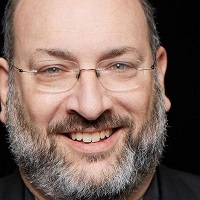 By David Harlow, JD MPH, Principal, The Harlow Group LLC
By David Harlow, JD MPH, Principal, The Harlow Group LLC
Twitter: @healthblawg
Host: Harlow on Healthcare
Hashtag: #HarlowOnHC
It’s always a pleasure to speak with Matthew Holt (@boltyboy), co-founder of Health 2.0 — which was acquired by HIMSS, founder of The Health Care Blog, President of SMACK.health, a healthcare startup advisory service, and co-chair of Catalyst at Health 2.0, which runs challenges and code-a-thons. He is also a fellow graybeard / curmudgeon / professional skeptic.
Episode NOW on Demand
Matthew kicked off our conversation about his recent thinking about “flipping the stack” in healthcare by launching into a description of a Japanese law in effect circa 1990 that gave mom-and-pop stores veto power over development of large retail stores and analogized that situation to the health care landscape in the U.S. today, where entrenched incumbents seek to “delay, deflect and stop” progress.
We talked about the development of new technologies in healthcare — both within and without the entrenched interests — and about the danger of “paving the cowpaths” as federal incentive dollars poured into the healthcare sector, partially underwriting the implementation of new electronic health record systems, often without first reviewing and changing underlying workflows.
Matthew suggested that the cowpaths are going to have superhighways built around them, like a “bypass” around a British village. This is what he and his co-author and partner Indu Subaiya mean by “flipping the stack.” They are looking to a future where digital tools will drive healthcare in a new direction because “technology can now do a lot more than it used to be able to. . . . Digital health, SMACK health, plus the stuff which hasn’t really gotten out there yet. Artificial intelligence and sensors everywhere and virtual reality . . . to try to detect who’s got what, who’s likely to get what, as soon as possible.” This requires data collection and analysis, tracking at home, while eating, sleeping, in the bathroom, through a web of always-on sensors. “Always monitoring and always messaging and always managing.”
We spoke a little about the convergence of providers and payors, and about whether the digital health will have (or will need) the ability to address healthcare more holistically rather than by picking off individual chronic conditions, but Matthew came back to focusing on the inroads he expects that technology companies will continue to make into the healthcare domain. He did acknowledge the fact that all healthcare organizations begin to work locally (like good old-fashioned TV stations). Just as the TV market has consolidated and become more national over time, Matthew expects consolidation in the payor and provider markets to continue, but also sees a long-term need to effect further cultural change in the healthcare institutional world, in the medical establishment, before technology-based healthcare delivery can be implemented at scale.
In the future, Matthew hopes to live in a world where he can stumble into the bathroom in the morning, step on a scale, have the latest iteration of Alexa or Google shout at him about what he’s doing, he would should back, he would have a lot of easy testing done, perhaps by breathing into a sensor — he hopes that daily health-related routines will be as simple as transportation using self-driving cars. He acknowledges that we need better control of technology companies’ use of our personal data, but while a relatively small percentage of people today (those with chronic illnesses) can truly benefit by health monitoring and messaging and management, in the future, he believes that we will all be able to benefit.
To learn more about Matthew’s perspective on the future of digital health, see the article he co-authored with his Health 2.0 and HIMSS partner Indu Subaiya, Flipping the Stack: Can New Technology Drive Health Care’s Future? in a new AHA Futurescan (ordering info via the link).
About the Show
Tune in to Harlow on Healthcare to hear healthcare attorney and award-winning blogger David Harlow and his guests discuss the critical issues shaping the future of health IT and healthcare at large. From cybersecurity to AI, precision medicine to health reform, if the topic is trending Harlow is on it.
This article was originally published on HealthBlawg and is republished here with permission.
